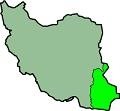 Ebrahim Mehrnahad (16) is in Zahedan, Sistan-e-Baluchestan province convicted by the Revolutionary Courts to 5 years in prison, from which 2 years are conditional.
Ebrahim Mehrnahad (16) is in Zahedan, Sistan-e-Baluchestan province convicted by the Revolutionary Courts to 5 years in prison, from which 2 years are conditional.
He has been found guilty with "attempts against the nations security".
He was not allowed to have acces to a defence-lawyer.
He is in prison since March and he was fysically and mentally abused.
He is the younger brother from Yaghoub Mehrnahad, who was hanged in August after he was convicted of having links to the violent rebel group Jundallah (Soldiers of God).
Others say that Yaghoub Mehrnahad was a student journalist who also chaired a regional civil rights group named the Voice of Justice..
Ebrahim Mehrnahad blogged about his brother and mediated news about him. The deathsentences to which the court in Rasht, Gilan province, spoke against Mahyar Haghgoo and his mother Maryam are approved by the Supreme Court.
The deathsentences to which the court in Rasht, Gilan province, spoke against Mahyar Haghgoo and his mother Maryam are approved by the Supreme Court.
When he was 17-year-old Mahyar killed his father in 2004.His father, an alcoholic, was beating up his mother. Suffering from temporary insanity , he and his mother killed his father. The website Tabnak wrote Friday that the spokesman of State Security Forces (SSF) said that 61 people were arrested and 157 people were warned for eating in public.
The website Tabnak wrote Friday that the spokesman of State Security Forces (SSF) said that 61 people were arrested and 157 people were warned for eating in public.
Four restaurants were sealed for selling food in the morning hours.
Seven drivers were stopped and their vehicles towed away for eating while driving.
Eating in public is considered a serious violation of the law in the month of Ramadan in Iran.
Only passengers with a valid airline, train or bus ticket are allowed to eat. Iran's great demand for water,that is being drawn out of aquifers far faster than it can be replenished, is according to a new study the cause of sunken farmland, and cracked buildings.
Iran's great demand for water,that is being drawn out of aquifers far faster than it can be replenished, is according to a new study the cause of sunken farmland, and cracked buildings.
Estimates suggest the water levels in Iranian ground have declined by an average of nearly half a meter every year over the last 15 years.
Satellite radar observations—collected by GFZ, the German Research Centre for Geosciences based in Potsdam, Germany, show the severity of the situation.
Satellite radar images of the land surface dating back to 1997 compared with water level data, has shown that water withdrawal from aquifers is creating a major dilemma.
Iran is a dry country,and only 10 percent of the country receives enough rainfall to meet its needs.
The remainder of the country is heavily reliant on groundwater, with around 50 percent of Iran's water being supplied by aquifers. Growth of population and agricultural-technical and economical development increased water usage.
But the aquifers have not been able to keep up, some aquifers need thousands of years to fill up.
Farmers have to dig deeper wells every year and cracks are appearing in buildings, roads, and pipelines in cities.
Earthquakes can be more dangerous because loose soil makes the ground shake more easily.
A solution can be found like in San Francisco USA, who imports their water elsewhere from the mountains.
It is expected that water problems are likely to become an issue in many Middle Eastern countries.
In Iran there are childoffenders, still on death row.
Children are being hanged to death.
A child will be hanged to death.
Poster amnesty.nl
Tuesday, September 23, 2008
Iran: shirk
Subscribe to:
Post Comments (Atom)

.jpg)


No comments:
Post a Comment